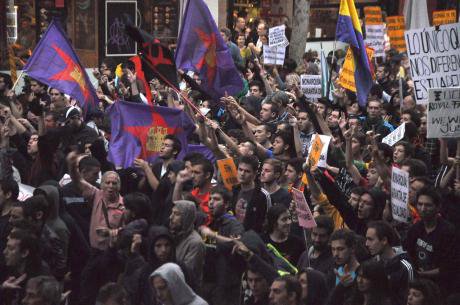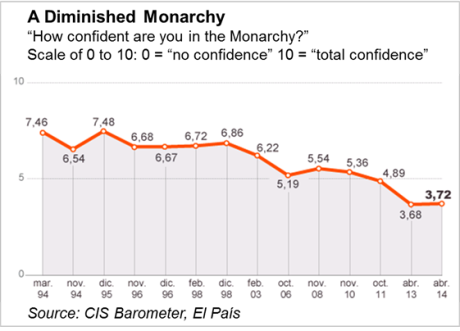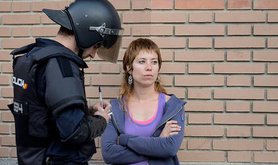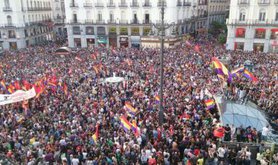
Anti-Monarchy protests had taken place in Spain in September 2013. Demotix/Fernando Capdepon Arroyo. All rights reserved.
After 39 years on the throne, Juan Carlos de Borbón has announced his abdication of the Spanish Crown in favor of his son, Felipe. The departing monarch addressed the nation in a televised address to express the pride and gratitude he felt towards the people of Spain for the tremendous progress made since the transition to democracy.
Juan Carlos leaves the throne in the midst of a profound economic, social and political crisis. His nation remains mired in a deep economic crisis, with high unemployment, millions slipping into poverty and increased inequality. The two party monopoly in political power enjoyed by the People’s Party and the Socialist Workers Party since the transition has suffered a severe erosion culminating in a disastrous performance in last weekend’s European Election. Juan Carlos has presided over a vast deterioration in the popularity of the Spanish monarchy and bears more than a small part of the responsibility. He might also be the last king of a united Spain; the Catalans seem determined on exercising their right to vote on their future irrespective of the succession.
White Knight or Grey Eminence?
Both Spanish and foreign media have been rapid and fulsome in their praise for the Bourbon monarch. From President Obama to European Commission President Barroso, world leaders have emphasized Juan Carlos’ role in providing stability and assurance in Spain’s difficult transition from fascism to democracy.
Yet the King’s role in the transition is neither clear-cut nor uncontroversial. The Spanish monarchy had been abolished in 1931 and the Bourbons had gone into exile. After the Civil War and the fall of the Second Republic, the newly installed fascist dictator Franco saw no need to share power with the royal family. It was not until Franco was nearing the end of this life that he hand-picked the young Juan Carlos as the future hedge against a return to a republican government in Spain. The young pretender to the throne shared responsibilities with the aging dictator and assumed an ever greater role as head of state during the dictator’s last years.
Franco died on November 20th, 1975 and Juan Carlos was proclaimed King of Spain by Franco’s judiciary five days later. When Spaniards voted on a new constitution in 1978, the monarchy was a non-negotiable part of it.
The king’s greatest moment came in 1981, during the attempted coup known as the “23-F”. Members of the Civil Guard, incensed by the rapid democratization of the country and the legitimation of the Socialist and Communist parties, attempted to reimpose authoritarianism by storming the Spanish parliament and holding the delegates hostage. They claimed they acted in the name of the King, but Juan Carlos refused to accept their calls and actively worked to express his support for the democratically elected government and to ensure that the military stayed in its barracks. The coup collapsed so quickly that many Spaniards today view it as almost farcical, but no one who had lived through the horrors of Franco’s reign took the threat lightly. Juan Carlos won immense prestige for his role from all political leaders across the spectrum.
Yet even this legacy has been questioned. In her best-selling book “The Great Forgetting” released in April this year, veteran journalist Pilar Urbano paints a less heroic image of the youthful monarch. Ms. Urbano writes that the King was not unaware of the motions of the Civil Guards, who had reasons for supposing they were acting in monarch’s interest if not on his instruction. Though the author does not deny the impact of Juan Carlos’ public declaration against the coup, Ms. Urbano declares that it only came after it was clear that the coup was destined for failure. Needless to say, the book raised a firestorm of controversy which has only been further fanned by Monday’s declaration.
The Fall of a King
Regardless of these insinuations, a generation of Spaniards grew old with Juan Carlos as the king that restored democracy; and another generation grew up with no direct experience of Franco’s rule, only of the monarch’s light touch in daily political life. The monarchy enjoyed widespread support across most segments of the population and especially among the survivors of the fascist regime. Even most supporters of Republic were perfectly willing to let Juan Carlos conclude his reign before pushing for change.
That base of support has been eroded in recent years. The diminished role of the Franco generation explains part of this change; but the ruin of the monarch’s reputation and that of the institution he represents comes from a series of blunders and scandals that could and should have been avoided.

Criticism has been growing for some time about the opacity of the Royal House’s finances and the personal fortune of the king. When Juan Carlos returned to Spain, the Bourbon’s were penniless; today, they are worth an estimated EUR 1.7 billion (USD 2.3 billion) though no one knows for sure because the King’s accounts are shrouded in secrecy[i]. The public remains unaware of how the Bourbons have gone from paupers to billionaires, but it is surely not by earning interest on the official royal salary of EUR 300,000[ii]. No one accuses the King of outright corruption, for the many luxurious gifts he has received are in the name of the Spanish state; but the fact remains that reiterated calls for transparency in the royal accounting have been met until last year by stony silence.
If the King is not accused of corruption, his family is. The King’s son-in-law, Iñaki Undargarín, has been indicted for embezzlement of public funds, falsification and money laundering, and perverting the course of justice, through the illegal activities of his non-profit Nóos organization and a ring of corporate cronies. If that is not bad enough, Princess Cristina, Undargarín’s wife, has been repeatedly questioned and finally indicted for her role as a Board member of the organization. The scandal itself has rocked the monarchy, but so too has the public perception of political favoritism, back channel pressure and willingness to subvert justice that has run through the case. At every stage, there have been efforts to absolve the Princess and cover her in a veil of ignorance bordering on amnesia: even the defrauded Treasury has had its agents formally absolve the role of the Princess in the multi-million euro evasions that bear her name and signature, though the judge does not believe their testimony[iii]. The Spanish Constitution declares that justice will be applied equally to all members of Spanish society, regardless of rank: so Spaniards are incensed to learn that some people appear to be more equal than others.
The King suffered injury to both his person and his reputation when, in he went on a safari in Botswana in April 2012. Spanish GDP was mired in recession, unemployment had reached historic levels above 26% and the King had been on television calling on the nation for collective sacrifice to overcome the crisis. The same nation awoke the next morning to learn that the King had broken his hip on a secret hunting trip; funded by a personal friend of the King and advisor to the Saudi Royal House; with his reputed lover, the German Princess Corinna zu Sayn-Wittgenstein; and requiring a Spanish military transport to return him to Spain. This was not even the first time Botswana had figured in a royal gaffe; in 2005, the King had gone hunting in the African nation just days after 17 Spanish soldiers had died in Afghanistan when their helicopter crashed.[iv] These blunders have reinforced the image of a playboy king, utterly out of touch with the reality and daily suffering of the common Spaniard.
Ultimate Sacrifice
It does not come as much of a shock that the King should decide to abdicate in favor of the more popular and charismatic Felipe. There has been speculation since the Botswana incident that rejuvenation in the Royal House was imminent; and the King admits as much in his farewell address. The ostensible timing was to allow the king to return fully to his duties after his long convalescence from hip surgery, thus ensuring complete normality in the transition; the King also wanted to wait until after the European Elections to avoid turning the succession into an electoral issue.
The extremely strong showing of the United Left and Podemos in those elections, both strongly anti-monarchical parties, undoubtedly hastened the decision. If the decline of the two mainstream parties continues, the next general elections might do away with the absolute majority of the People’s Party and even usher in the possibility of a coalition of the Left ruling Spain. This could be disastrous for a smooth and uncontested transition as both United Left and Podemos have called for referendums on a republican government. The Spanish Socialist Workers Party has not echoed that call: so the fact that Alfredo Rubalcaba will be stepping down from his role as party leader in the wake of electoral disaster might also have influenced the decision. Mr. Rubalcaba is an old parliamentary hand who knows and esteems the king personally, while his successor might not.
Having the support of both majority parties is critical because the succession is not actually codified into law. The Spanish Constitution calls for an ad hoc process to take place through the Parliament at the time of the King’s abdication or death[v]; and so Mariano Rajoy has called for an extraordinary meeting of ministers on Tuesday April 6th to propose a succession law. The Parliament will then have to approve the measure, which is not in doubt as the pro-monarchy People’s Party enjoys an absolute majority, but the royals undoubtedly are hoping for unanimity or something close to it, which is why Socialist backing matters. Felipe will immediately become the new head of state; the coronation is merely a ceremonial formality that will take place afterwards.
The succession law will also include another provision which might be controversial in the future: lifetime immunity for the King. Once the King abdicates, the immunity from prosecution that attaches to his office will no longer apply to him. In order to avoid any future unpleasantness or scandal, the Parliament will undoubtedly include a provision of immunity for both Juan Carlos and Queen Sofia. If any past irregularities are uncovered in years to come, this might lead to awkwardness and public anger.
The King has abdicated to save the monarchy and pass his inheritance intact to his son before his waning popularity gave out; but the action has sparked the most intense debate in the nation over the future of Spain. Demonstrations were organized immediately through social media in Madrid, Valencia, Barcelona, Bilbao and other major cities. Supporters of a Third Spanish Republic came out in large numbers last night, waving the republican flag and calling for a referendum on the future of the monarchy. They will not get their wish before Felipe becomes King; but if Felipe is more popular today than his father, he also enjoys gets none of the credit for the transition to Spanish democracy. Popular discontent with the monarchy and calls for its abolition are not going to go away.
Juan Carlos might also have wanted to endow his son with the Spanish crown while it still ruled over the whole of Spain. In Catalonia, the King’s announcement was greeted by Artur Mas with a cordial, if strained, commendation of the old King’s role in the transition, and an equally cordial felicitation to the new king: but with the clear message that the Catalan referendum on independence was not going to be affected or delayed in any way[vi]. Politically, Mr. Mas has no choice: his governing CiU was outvoted for the first time in history by the Catalan Republican Left (ERC) in the European Elections. The ERC’s stance on monarchy and independence is plain enough from their name that no additional explanation is required. Backing off the referendum promise at this point would be political suicide, and open the door to a landslide ERC victory in the 2016 regional elections.
That public stance does not mean that no private dialogues are underway. Juan Carlos might have understood that his continued reign was an impediment to negotiation: his ties to Franco, his role in the formation of the current constitution, all spoke against his playing the role of intermediary with Catalan moderates. Felipe is free of all that baggage, and could indeed present himself as “the third way” for a new agreement between the Catalan people and the Spanish state. An offer based on federalism and recognition of Catalonia’s “special status” that would amount to independence in all but name, united under the Bourbon crown, might find many takers in the region – especially those who are frightened by the potential for catastrophic outcomes should an illegal referendum proceed and the Spanish governments attempts to stop it with the Civil Guard.
This is not idle speculation – the idea of an independent Catalonia keeping the dynastic alliance was placed before Catalan Judge Santiago Vidal by no less than the General Council of the Judiciary last Tuesday[vii]. Mr. Vidal had been invited to present his proposals for a Catalan constitution and was cordially received. The General Council was obviously informed of the King’s imminent abdication: the question was clearly loaded. Mr. Vidal politely avoided the question, indicating that it was a decision for the Catalan people; but the draft constitution is tellingly that of a republic, not a constitutional monarchy.
Prince Felipe has his work cut out for him; advocates of the monarchy are few and far between in Catalonia. But the new king will find himself struggling even to convince the rest of Spain that the monarchy should be preserved. Much will be revealed by his initial statements after his formal accession to the throne. So far, the Prince has remained silent, but that silence cannot last: otherwise, Felipe might find himself to be the last King of Spain.
Read more
Get our weekly email



Comments
We encourage anyone to comment, please consult the oD commenting guidelines if you have any questions.